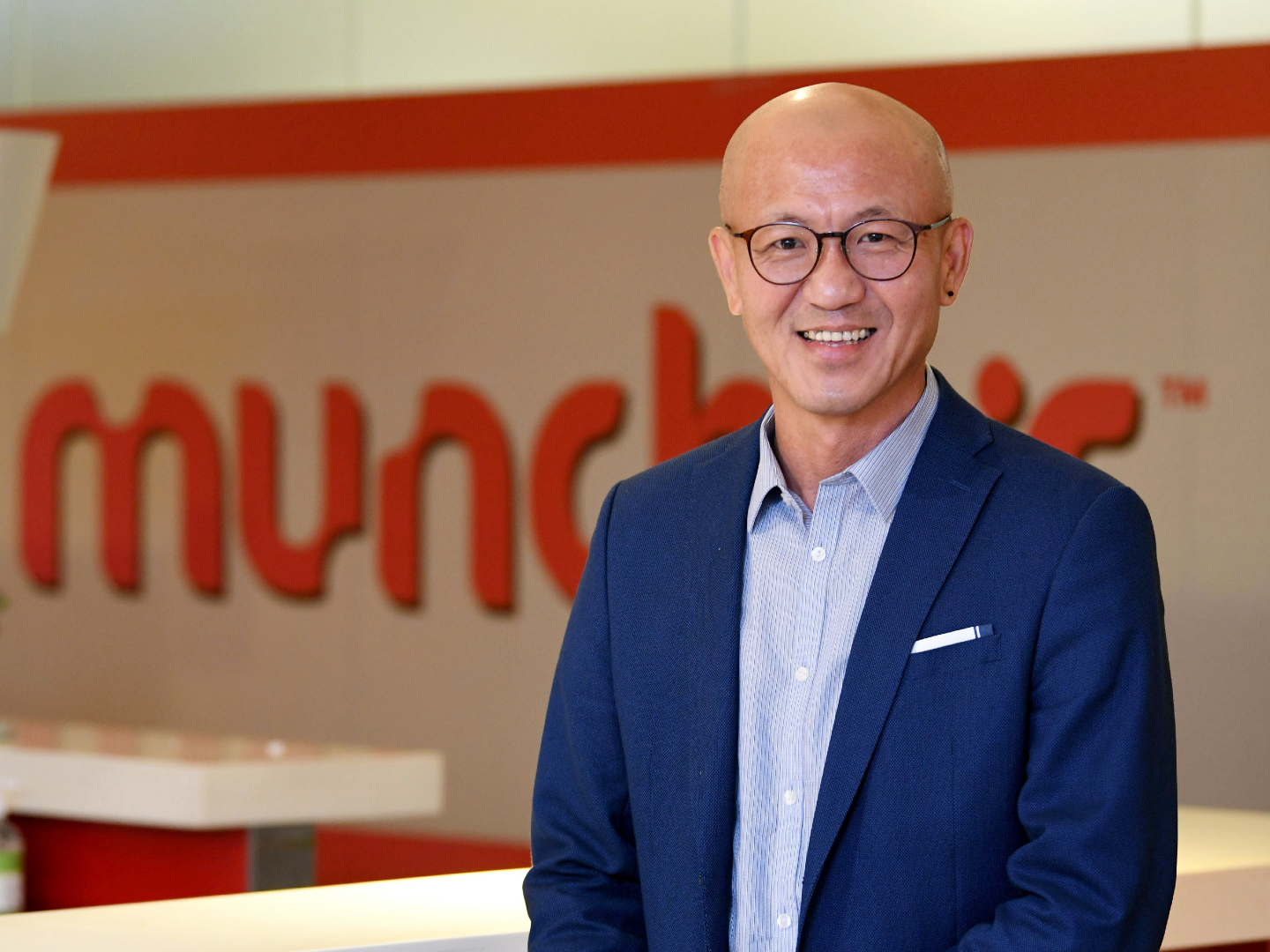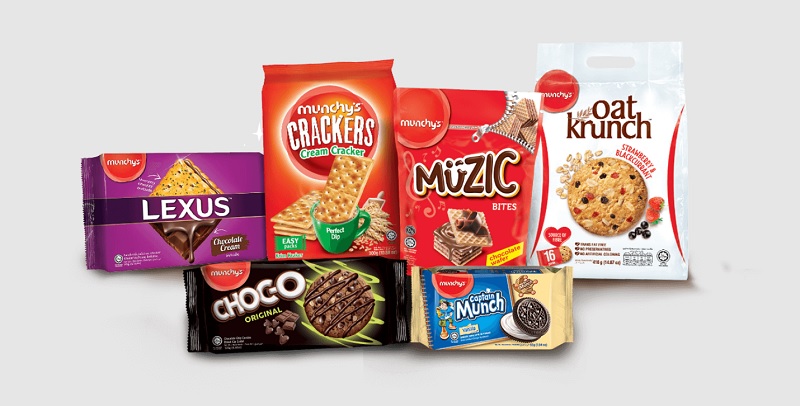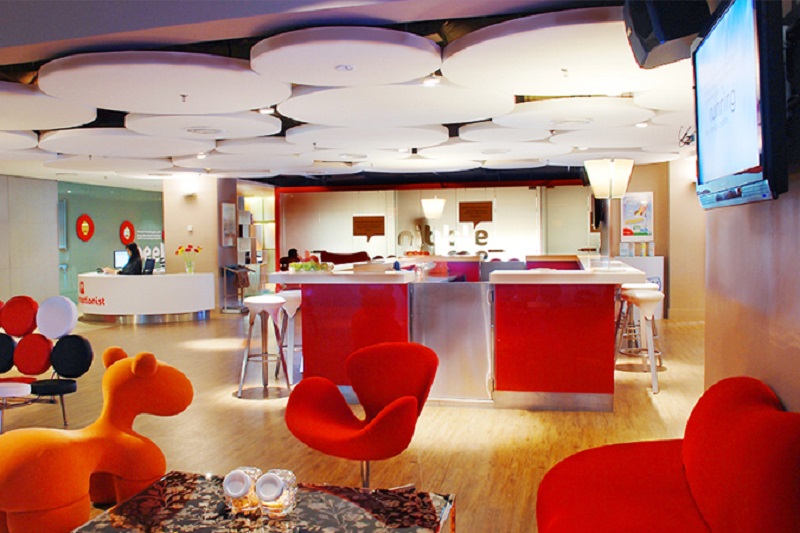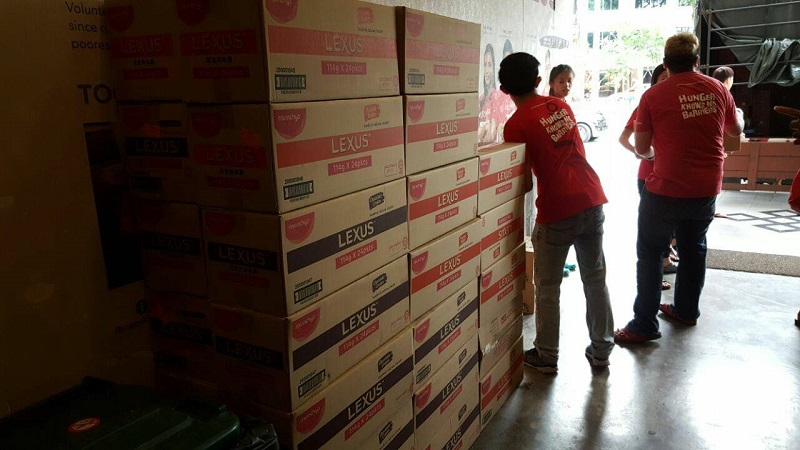
Wong was quick to put to work the invaluable lessons on leadership and management he gathered through the years (Photo: Sam Fong/The Edge)
If you were part of the crowds trawling through supermarket aisles right before the first Covid-19 lockdown in March last year, you might have been confronted by empty shelves. This was to be expected for pantry staples such as bread, rice and noodles, but,in some places, it also extended to crisps and biscuits. If confined to home indefinitely, it appeared, Malaysians wanted their little luxuries.
Among the most recognisable biscuit brands in supermarkets is Munchy’s. Founded in 1991 by the five Tan brothers, it came to life with a single second-hand wafer stick machine in Batu Pahat, Johor. Over the next three decades, the company grew into a household name and then an award-winning global powerhouse; currently, its products are distributed in more than 50 countries.
Fans know it by its high-quality products, such as the sweet-and-savoury Lexus sandwiches filled with cream, the heart-healthy and fibre-rich Oat Krunch studded with fruit, nuts or chocolate chips, Muzic wafer bites and tea favourite Munchy’s Crackers. The variety of packaging alludes to the many occasions these biscuits are enjoyed, from large family packs to convenient mini packages ideal for school, sports or snacking.
“I must say our founders were exceptional at research and development; they entrenched this so deeply into the company culture that we are consistently acknowledged as among the most innovative companies within our category,” says CEO Rodney Wong.
“We have brilliant, unique products such as Choc-O, which has a luxurious chocolate drizzle on top, and the Lexus chocolate and vanilla variants with a touch of Himalayan salt for that perfect balance of sweet and savoury, and crunch and cream. Oat Krunch has variants that feature 40% oats, which is rarely seen in the market since that is tricky to perfect in terms of taste and texture. But we are able to do this since we don’t compromise on ingredients.”
20210405_peo_rodney_wong_6_sam_fong_the_edge.jpg

Wong learnt this first-hand in his early days at the brand. Fresh from Petronas Lubricant Malaysia, where he served as general manager, he assumed the mantle of Munchy’s CEO in July 2014 with a sharp eye on the faltering bottom line. Cost-cutting measures had to be implemented.
“To improve profitability, I asked whether we could swap Barry Callebaut chocolate, which is like the Rolls-Royce of chocolate suppliers to factories, for cheaper chocolate but was told ‘no’ in no uncertain terms,” he recalls with a laugh. “They insisted that good products can come only from good ingredients, and I now champion this whole-heartedly.”
Safe passage through storms
This was not his first rodeo in the fast-moving consumer goods segment. Wong’s résumé includes previous stints at Coca-Cola Refreshments Malaysia and Unilever. He brought with him invaluable lessons on leadership and management, which he was quick to put to work.
“There were areas in definite need of improvement, but even as we were looking to run more efficiently and effectively, one area I refused to stop spending on was investing in our people,” he says. “It’s very simple. If your people are at a certain level in terms of skill, that is as high as your business can go. Raise your people, and your results will follow suit. I know this from personal experience; I’ve had people who invested in me and it is because of them that I am where I am today.”
Anecdotal though his justification might have been, the results spoke for themselves, with performance improving drastically. Wong was determined that the employees were fairly rewarded. Bonuses at the time were slightly below market average, but the 2015 reports proved that they deserved better remuneration. It took two days of negotiations but he finally secured triple the usual pay-out. The following year, with continued favourable results and the establishment of a high-performance culture, negotiations took only two hours.
“People perform best when they feel seen and appreciated,” he says. “One of the things I’ve learnt is, if you put your people first, treat them well and give them the right tools and resources they need to do their job, they will succeed. My priorities are our people, customers and shareholders in that order. Look after your people and they will look after your customers, and thus your business. And good business makes everyone happy, especially the shareholders.”
The same philosophy carried the company through the chaos of the pandemic. As a food manufacturer, it was business as usual for those in the factory, though staff in the central office in Klang were asked to work from home. Safety was a major cause of concern, particularly as factory clusters were breaking out all over the country. Wong quickly sought to allay fears over job and financial security as well as personal safety.
“Our focus was on protecting our people and the business; they have to go together, as each relies on the other,” he explains. “Despite the lockdown announcement shortly before bonus season, we went ahead and paid out one of the best bonuses in recent years to reward and motivate staff. We developed stringent SOPs and provided all our employees with masks daily, including two masks a day for the 1,000 factory workers and salespeople. When we were allowed back to the office, we decided to limit movement by providing lunch and offered extra incentives such as allowances to keep morale high. We didn’t cut a single job or salary.”
Cumulatively, this was an investment that ran up to RM3.1 million, but its returns spoke volumes. Everyone worked harder than ever and all targets were met, leading to another round of full bonuses early this year, shares Wong. Upper management also met with the board to negotiate an additional month’s bonus for the frontliners, an action that resonated throughout the company.
Feedback is always welcome at Munchy’s — both internally and from consumers — as part of its culture of openness. Key concerns include its contribution to plastic waste, unavoidable in the packaged foods industry. The company has so far reduced the packaging materials used in production by 9% between 2019 and 2020, and is looking to shave off another 2% by year-end.
“Consumers want convenience, but this comes at a price. That said, we can try to be as eco-friendly as possible about it,” says Wong. “We are conscientiously more efficient in our use of plastic and are converting as much as possible of our packaging to recyclable materials. We are looking to 100% biodegradable packaging but we’re not there yet, as we need to ensure the materials we use are of food grade.
“Plastic is not the only way we can ease the planet’s burden; we’ve also adopted renewable energy by producing and using solar power at our factories and have been certified by The Planet Mark for our commitment to reducing carbon emissions by 2% annually.”
munchys.jpg

Happiness by design
A happy workforce is a productive workforce, but productivity is not the main driver behind Wong’s decisions and actions. Instead, it is fulfilment. Whether at work or home, he finds the happiness of others to be his greatest source of joy and strives to ensure their needs and desires are met so they in turn can fulfil their own purpose and potential.
In the office, this translates into numerous initiatives, from heeding a company-wide call for laptops instead of desktops — “Of course, we couldn’t do this all at once, so we rolled out the migration between 2014 and 2017” — to considering satellite offices in the reconfiguration of office spaces in the post-pandemic era.
“I don’t think the five-day work week makes sense anymore. We didn’t see productivity decrease while working from home, so I see no reason to return to five days in the office,” shrugs Wong, who personally found merits in working from home. The better control he had over his time and diet led to his shedding an impressive 10kg in the past year.
“We are based in Klang, which dissuades a lot of talent from working with us and results in long commutes among those who live farther away. We’re looking at setting up satellite offices and offering employees some degree of flexibility in choosing how to arrange their work week. Some activities will require them to be physically present, but otherwise they can decide how many days they’d like to work from home or from any of our offices. I really don’t care how people do their work or how long they take to do it. As long as they deliver, who am I to tell them otherwise?”
Meanwhile, Munchy’s has also developed a manifesto of sorts, themed “Inspire Happiness through Delightful Creations”. It covers not only the production of tasty and even healthy products, but also in behaviours and actions that will delight employees, consumers and the community through its BITE ME culture (Bold, Innovation, Teamwork, Enthusiasm and Make a Difference).
career-office.jpg

As Munchy’s is a biscuit manufacturer, food is naturally often its medium of outreach. The company has partnered with Kechara Soup Kitchen since 2015 to supplement the latter’s provision of daily necessities with biscuits. Inspired by his son’s experience at a new job, Wong also initiated a buddy system at the office, whereby new hires are paired with a buddy to ensure they have someone to have lunch with every day.
“People sometimes forget little things such as what it’s like to be new and watching everyone go off in their own cliques for lunch,” he says. “As for our long-term partnership with Kechara, I find it heart-breaking to see elderly people lining up for a meal and I wanted to do what we could to ease their circumstances. That said, food is not always the answer. Last year, we sponsored an orphanage by donating RM100,000 that they could channel towards the children’s education through the purchase of computers or supplies. They already had food sponsored and we wanted to give them something they could really make use of.”
Giving back is not something he merely pays lip service to; the Kuching-born Wong upholds this in his personal life too as president of the Sarawak Children’s Cancer Society and vice-president of Children Cancer International, the world’s largest patient support organisation for childhood cancer. An immediate family member suffered from leukaemia as a child and the experience had a life-changing impact on Wong.
“I didn’t understand much about the disease and treatment until then, and witnessing the devastating effects of leukaemia on someone so young really shaped the way I live my life,” he says (his loved one is now cancer-free). “I used to be driven by money but now I prioritise the people in my life and my community. Even though I’m now based in Peninsular Malaysia, I’m still involved in the Sarawak Children’s Cancer Society. I joined the organisation in its early days, and it has now supported maybe 1,200 patients with centres in Miri and Kuching. Patients who travel to Kuching, where the paediatric oncology centre is, are provided with free accommodation at our centre as well as transportation and meal allowances. Cancer can be financially and emotionally debilitating, especially for the lower-income families in rural East Malaysia. So, we try to provide any support they need.”
munchys_kechara_soup_kitchen.jpg

He is also a mentor at Endeavour, a global entrepreneurship movement that leverages the network and experience of seasoned business leaders to help start-ups grow and scale their businesses.
“I really believe in paying it forward. I’ve had my share of terrific bosses and mentors, and am now giving back by spending time with start-up founders and sharing what I know about leadership, growth and strategic thinking,” says Wong. “Once I embraced that sharing mindset and focused on giving back and making people happy, I discovered deep joy. I truly feel that giving is better than receiving, and I get really irritated by transactional exchanges. If I do something, I don’t expect reciprocity. I try every day to become a leader or person I can respect, and giving authentically is part of that.”
Guided by grace
Sharing is a great trait to cultivate when you come from a big family. The fourth of six siblings — four boys and two girls — Wong recalls his childhood in Kuching fondly.
“We were so outdoorsy, swimming and fishing in the river and picking fruit in the jungle together,” he laughs. “We’re all scattered around Malaysia now, but we’ve made it a point to go on siblings-only holidays every so often. I think it’s important for our relationship to do things like this. As kids, you’re so close, but after you start working and have your own families, opportunities to spend time together like this are few and far between. But this time together and the memories we make are invaluable.”
The son of a broker and housewife, he discovered an interest in reading at a young age. “We weren’t a very well-to-do family. I loved reading, but as we couldn’t afford many books, I spent a lot of time in the public library poring over the fiction selection. I read everything from Enid Blyton to fantasies such as The Lord of the Rings trilogy,” shares Wong, whose childhood ambition was to be an archaeologist. “I still read widely across genres, but I’m now fussy about authors. Fiction is still my favourite. If find an author I like — such as David Baldacci, he’s a fantastic storyteller — I read their entire body of work. I do read non-fiction for work, but it definitely feels like work. I recently picked up something by Simon Sinek, who covers purpose and living life meaningfully. I might not agree with all his points, but I do appreciate some of his insights.”
While books hold many truths and much wisdom, it is mostly life experiences and his own conscience that guide him as he navigates the twists and turns of life.
“I have been very fortunate in so many ways, especially when it came to the people around me,” he says. “One of my favourite memories in choosing how to act is from when I was a regional manager at Unilever and didn’t hit my targets for the year. I was expecting a poor appraisal and remuneration, but my sales director, Michael Lee, simply smiled when he handed me my letter. To my surprise, I had a decent bonus and increment.
“I told him I didn’t understand how that was possible, and he said, ‘One bad year doesn’t make you a bad manager. You have done well for us and we know you are very capable.’ Instead of feeling defeated as I’d expected, I left the meeting more motivated than I’d ever been. I worked harder than ever. I’ll never forget that and practise that today. When you have an opportunity to act, what do you do? Do you demoralise or do you build up? That’s what I call a leadership moment. When you have the chance to do the right thing and act with grace, and you take it.”
This article first appeared on June 14, 2021 in The Edge Malaysia.


